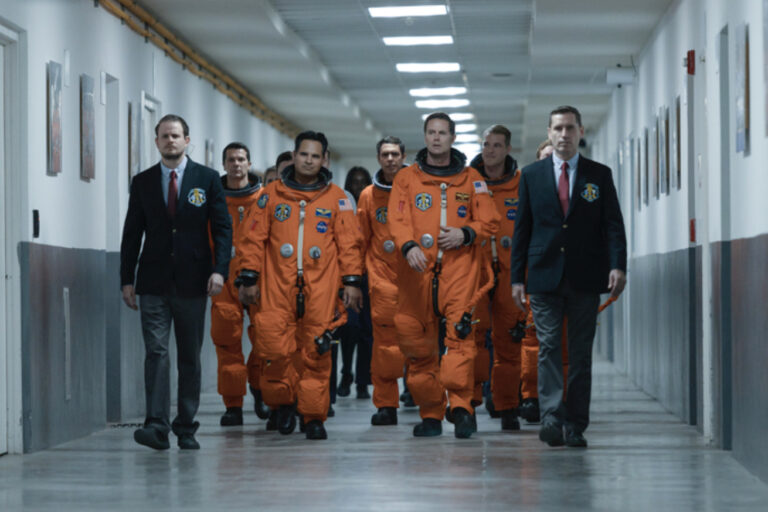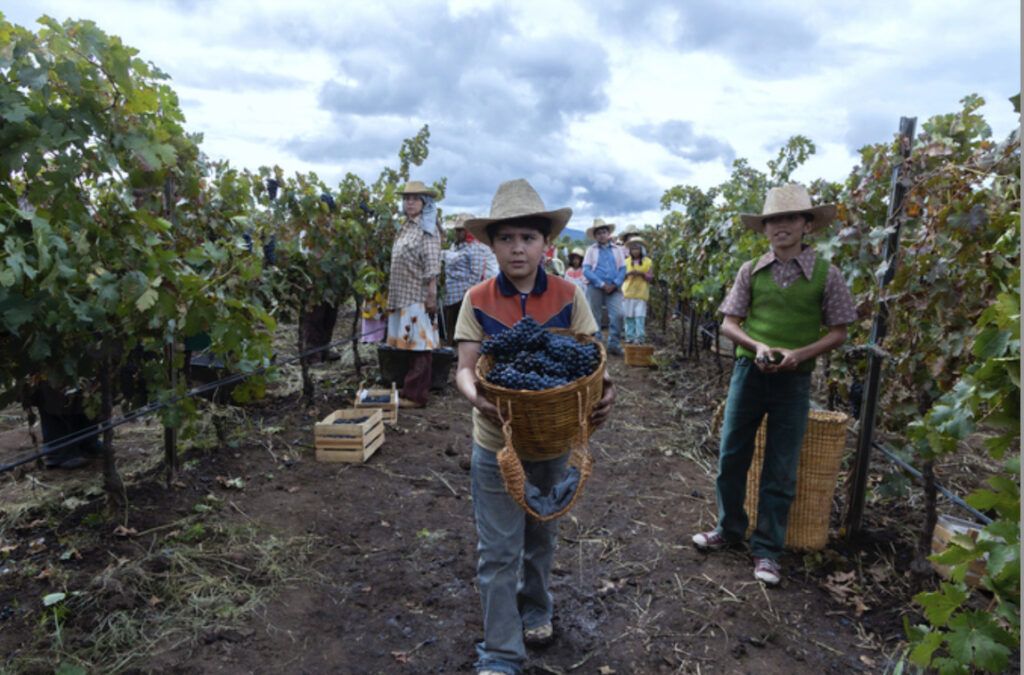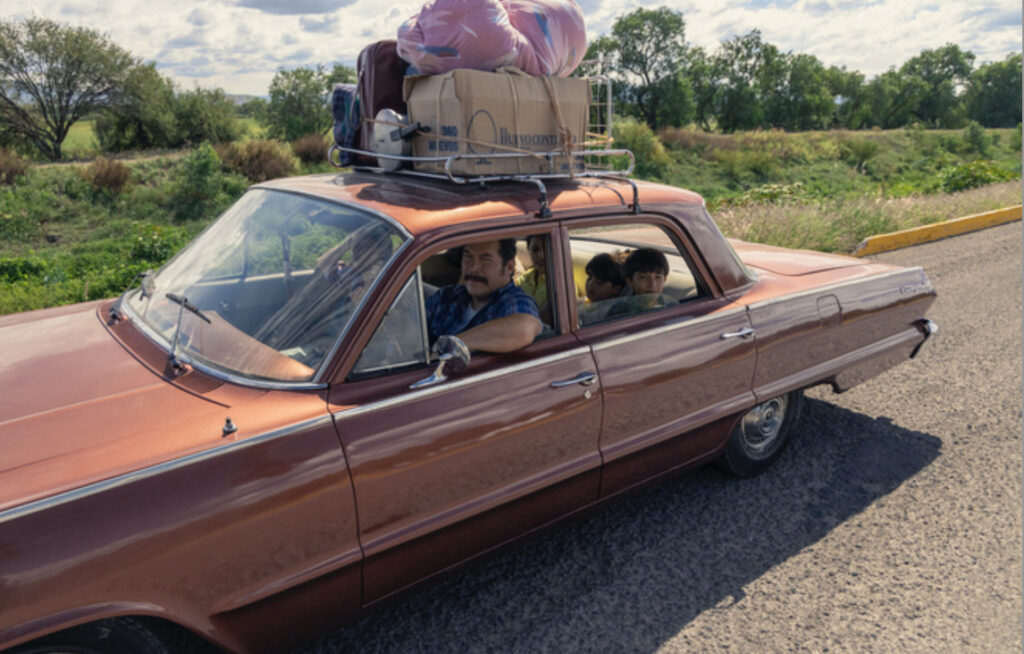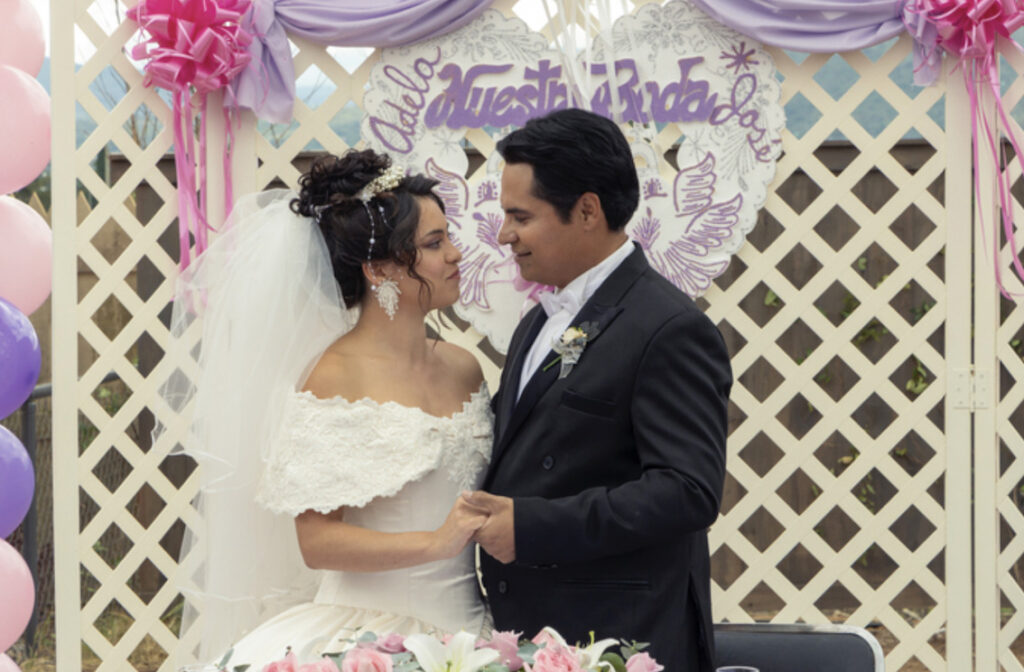
Synopsis : Inspired by the real-life story of NASA flight engineer José Hernández, A Million Miles Away follows him on a decades-long journey, from a rural village in Michoacán, Mexico, to more than 200 miles above the Earth in the International Space Station. With the support of his family, José’s drive & determination culminates in the opportunity to achieve his seemingly impossible goal.
Rating: PG
Genre: Biography, Drama
Original Language: English
Director: Alejandra Márquez Abella
Producer: Mark Ciardi, Campbell McInnes
Writer: Alejandra Márquez Abella, Bettina Gilois, Hernán Jiménez
Release Date (Theaters): Limited
Release Date (Streaming):
Runtime:
Distributor: Amazon Studios
Production Co: Amazon Studios, Select Films, Redrum

Exclusive Interview with Producers Mark Ciardi, Campbell McInnes
Q: Mark, you made the film “Million Dollar Arm.” You and Campbell collaborated on “Chappaquiddick.” You really have a knack for taking engaging true stories to the screen. What was it about Jose Hernandez’s life that struck a chord with you this time?
Mark Ciardi : This story really resonated with us. We love true stories that can inspire people and that have tremendous odds.This feels almost like a sports film, but it’s off the playing field. It’s about the mind and science. When Jose walked into our office four years ago, we just knew that this was an incredible story that would make a great movie and it’s been quite a ride ever since.
Q: Jose has had such an expansive life. In order to bring it down to the essentials, how did you collaborate with the screenwriters to bring him to life?
Campbell McInnis: Any time you’re trying to tell a story with the breadth of time that we had, you have to zero in on what details of the story which support the narrative that you are going to go with. What a rich life Jose has lived and continues to do so. With us, there’s the traditional three-act structure in a film. We wanted the audience to learn where he came from. Then we wanted them to show the obstacles that were set up against him. In the best way we could with the limited time we had, we wanted to give the audience a sense of his success with Livermore Labs before NASA. But we still needed time to show everything that it takes once you get into NASA and actually make it to space. So it was a tall order and a credit to Bettina Gilois, Hernan Jimenez and Alejandra Marquez Abella, who was also our director, for their great work on the screenplay. Also hats off to Hervé Schneid, our editor, who was able to use some montages in a beautiful way that helped us move through time without losing emotion or narrative drive.
Q: That’s so true. It’s amazing to see the depiction of the story of immigrant kids who worked on the farm before they went to elementary school. How important was it for you to capture that element from the immigrant kids’ perspective? That’s not necessarily familiar to non-immigrant folks.
Mark Ciardi: In talking with Jose, [I learned] what it was like for him at that time when he was traveling between Mexico and the US. With his English not being that great and he’s moving from school to school, that had a big impact on him. His dad had such a powerful impact on him as well, giving him a road map as to working hard. I love what he said to the kids,”Look outside, this might not be your future, but it will always be your past.” To have that mindset and know that he had to work hard and was going to pursue this American dream to excel, it just shows you what you can do when you put your mind to it. I think it will inspire a lot of kids.

Q: Did you happen to meet Jose Hernandez prior to making the film? What was your impression of him and which of his characteristics did you want to bring it to the screen?
Campbell McInnis: We met Jose when he came into our office over four years ago. We had some executive producers on the project, Rick Telles and Benito Martinez, who had reached out to Jose and gotten his life rights. They then wanted to partner with producers who had a track record of getting movies made. Jose was incredibly charismatic. He had liked the way that he was able to talk about his journey from being the child of migrant farm workers, about the schools that he would go to following the harvest, about heading back to Mexico for the holidays and then doing it all over again.
He was born in the US but meeting him and sitting down with an astronaut, how many people make it to become astronauts and then an astronaut who began with such humble beginnings. It really speaks to the melting pot that is the United States and sometimes it gets politicized but the reality is that, all of us are immigrants if you go back [far] enough, just to see what a value added element immigrants can be to our nation. It’s a great story to tell. It’s not meant to be controversial at all. It’s just a reality. We all have roots and to see somebody achieve so quickly from one generation to the next I think will inspire a lot of people.
Q: The young Jose Hernandez asked his teacher, Miss Young [Michelle Krusiec] about what the stars are for — to have that inspirational mentor — how important was it for you to include that element? There’s a lot of people who started from a very humble background and don’t get that chance or the inspiration [to learn] from others to do something different from what their fathers do. How important was it for you to include that teacher, that mentor element here?
Mark Ciardi: Jose took elements of his life that helped drive him whether it was his father or people in the community, like his cousin Betto or his wife. I think what we did well in this film was to show how much of the village it took for him to rise to great heights. It wasn’t just himself; he had a lot of confidence that was instilled in him. He could realize this dream that most would give up. Most wouldn’t even try. For him not giving up after going through 11 rejections and finally getting into NASA on his 12th try, then moving his family, he had to overcome so much.
Then, meeting Kalpana [Chawla, an astronaut who died in the Columbia explosion] and having her as an inspiration, there were just a lot of things that helped him along the way. He was relentless. That’s such a great element of really always going for your dream and not being deterred because it’s easy to give up. Everybody knows the odds of a difficult challenge whether it is in someone’s career or what they hope to do or even in their personal life. I think what this movie will do is inspire people to try different things that they might not think are possible.
Q: Talk about that incredible speech Jose Hernandez gave when he entered NASA.
Campbell McInnis: As we mentioned, it’s a big story to compress. Jose had made inroads at NASA and gotten on their radar in other ways. If you read his book, you can get the full story. But in the interest of time, we were able to compress it into this powerful cinematic moment where Adela, who was always his cheerleader, was the one that really gives him that final push to really dive into achieving this dream.
It was so important to him and to have her make that suggestion for him to go and bear his soul and honestly share everything he’s done for the last 10 years, academically, in his career, all with the space program in mind. He literally says that and if you meet Jose and hear him talk, that’s exactly what he did. It was a collaboration between Alejandra and our screenwriters and then Michael reading the script and then coming up with the best way to deliver that scene and we found this really amazing location, right? you really see this small man against this huge, NASA physical physical structure It all just plays to really highlight the journey in a compelling way.

Q: What about the process of casting Michael Pena? And because I think they are a perfect chemistry there. So talk about the casting.
Mark Ciardi: Michael [Pena] was our first choice from when Jose first came into our office four years ago. There were a lot of actresses that read for the Adela character. Then we had several do a chemistry read with Michael and Rosa [Salazar] just stood out. It felt like their chemistry [worked] and what she brought to it was just amazing. It was very obvious and she did a great job. She’s the big revelation of this movie, to be honest. We were blown away by her portrayal of Adela’s character and how meaningful it became where it wasn’t just the wife, the sidekick, it was a real two-hander with Michael.
Q: It’s amazing what you have to know in order to be an astronaut. Some of them are pilots and some are technicians. Some can be deep-sea divers and speak multiple languages. How difficult it is to become one. It’s an impossible task.
Campbell McInnis: It’s incredible and interesting that there are a lot of astronauts who are really piloting spacecraft and a lot of them come from being test pilots in the military. You also have important research being done by scientists right on the space shuttle and the International Space Station. What’s really neat about Jose is that he’s sitting there in between the two pilots, responsible for docking the space shuttle to the International Space Center.
He also has this incredible science background with everything he was doing with laser technology at Livermore. He has both skill sets. Obviously, every year he would look at the resumes of people that got in and he’d go, “Well, this guy can speak Russian. Well, maybe I should go to Russia and learn Russian.” So he kept improving his resume year after year. We couldn’t spend two hours showing that. We were able to do some montages and other things to show that. Each year he got rejected, he would improve upon his resume with new skills.
Q: What do you want the audience to take away from this wonderful film?
Mark Ciardi: the themes in this film are universal. Obviously, this is a Mexican American story, but it’s just such a tough dream to try and make into a reality. I think that will resonate with everyone, how hard something is and never giving up. Those are all universal themes that I think someone in Europe or anywhere in the world can connect with. It’s not just an American or a Mexican American story. It’s a universal story. These themes everyone can understand. And there’s the joy you feel at the end when he finally goes to space. It’s the journey and that incredible two-hour ride that we take with Jose.
Campbell McInnis: Hopefully it inspires some kids to reach for their dreams. That’s important for us to be able to have a message that can be transformed in a positive way to a mass audience. We’re excited about that.

